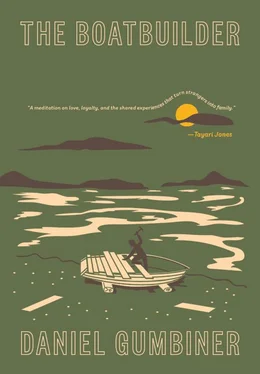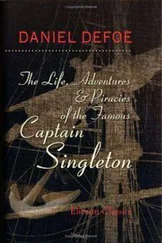“It was basically just like a bar mitzvah,” Simon said.
“It was not a bar mitzvah, Simon. It was a wedding.”
“It reminded me of a bar mitzvah.”
In general, they picked up passengers at Pier 4, near Talinas, and sailed them around the bay for two hours, usually during sunset. Garrett and Simon did most of the sailing and Berg, as second mate, served food and drinks. Garrett bought all of the food at a discount grocery store: hummus variety packs, sliced cheeses, potato chips, and, if the client had ordered the “deluxe food package,” deli sandwiches. Mangini didn’t want the clients to know where the food came from so Berg was required to take it out of its packaging in the galley and serve it on a platter or in a white bowl. Whenever anyone asked where the food came from, Garrett said they had a “private caterer.”
If there was down time during a charter, Simon would show Berg how to do certain things on the boat. He learned how to raise the mainsail and how to use a winch handle and how to tie a bowline. The work wasn’t exhausting but it was physical. He liked how his body was pleasantly fatigued at the end of the day, how his skin smelled like sun.
Berg was down to about four pills a day, but he was having a hard time reducing his dose further. He was, he knew, terrified of withdrawal, traumatized by his first experience of it. His whole body wracked with pain, bone-deep pain, and freezing cold. Always the cold in the morning, icy and dry, as if he’d slept in the frozen food aisle of the supermarket. Yawning and sneezing. Diarrhea and sticky chemical sweat. His body expelling fluid through every orifice available, it seemed, except for his ears.
Now that he had a job he had begun to look at places to move, but it was difficult to find affordable housing in Talinas. He talked to one guy who wanted to rent out his trailer and an older woman who wanted a live-in caretaker. He looked for housing in Five Brooks, Glen Meadow, and Palomarin, but he couldn’t find anything. Palomarin was closer to the eastern suburban corridor and much more expensive, and Glen Meadow and Five Brooks were so small that there were never any places for rent.
Lansing’s health was steadily improving, and every morning Berg inspected her closely, resupplied her with food and water. He thought she needed to be moved out of the crate, to a larger enclosure, but he was reticent to return her to the coop. She still appeared weak and he feared that the other chickens would attack her. He decided to build her a small coop out of redwood siding and two-by-fours that he found behind the house. He was getting better with his hands now: he had picked up a few tips from Garrett and Simon and he trusted himself with the contours of basic construction.
He spent too much time building the coop, outfitting it with several embellishments, including a circular door and windowsill flowers. When he was finished, he brought Lansing out to her new home. As he watched her flap around inside the coop, he was filled with a sense of accomplishment. It was all out of proportion with what he had done, but it was a nice feeling.
NELL HAD BROWN HAIR and green eyes and a dimple in her nose the size of a pea. She worked in film as a freelance wardrobe assistant but she wanted to make her living as a musician. For the past couple of months she’d been opening for a band named Carlos Carlos de Carlos, who had heard her play at a house show in the city and invited her on their tour. It was the longest tour she’d ever done, from San Francisco to Atlanta, but it was finally over and she was back at her place in the city and coming up to see him in Talinas.
The day she visited, they hiked the trail that ran along Sausal Creek and down to Miller’s Point. It was a warm day, with no fog, and all along the trail there were orange monkey flowers and sweet-smelling sagebrush. Berg brought sandwiches, a thermos of coffee, and a couple of bananas. As they walked toward the point, they passed a group of young men who were fishing. Nell greeted them and asked them what they had caught.
“Rays, mostly,” one of the men said.
“What are you trying to catch?” Nell asked.
The man thought for a moment. “I guess… whatever,” he said.
“Whatever,” Nell repeated.
“Yeah, whatever,” he said, shrugging.
They walked past the men, out to the point, and sat down on the grass with a crunch. Berg looked out at the water, which was full of small pale waves. Nell inspected her arm.
“I think I might have brushed some poison oak back there,” she said.
Nell was extremely allergic to poison oak. She seemed to get it every other time she went on a hike. When she was a junior in high school, she got it all around her mouth because she’d rubbed her face with a mango skin, which, it turns out, has the same toxin as poison oak. She toured colleges like this, the allergic skin red and swollen, ringing her lips like a goatee. Berg had seen photos.
“Seems okay to me,” Berg said, looking at the arm in question.
“It can take days to show up,” Nell said. “It’s okay. I’ll just wash myself with the poison oak soap when I get home. I brought some.”
Berg handed Nell her sandwich. She took a bite and looked back toward the fishermen.
“People fish over there a lot,” Berg said, following her gaze.
“I get it,” Nell said. “It seems like a great place to hang out. Bring a few beers, sit in the sun, catch some whatever fish.”
Berg laughed. “Lean this way,” he said. “I want to take a picture of you. The light is so good.”
“With or without sandwich?”
“With.”
He took out his phone and aimed the camera. Nell pursed her lips, opened her eyes wide like she’d just heard something very surprising.
“Relax,” he said. “You always make a weird face.”
“I can’t help it.”
She tried to strike a different pose but only looked stiffer, more self-conscious.
“Don’t be weird,” Berg said. “Just be yourself.”
“I’m weird in photos,” Nell replied. “That is myself.”
After their picnic, Berg drove Nell over to Talinas and showed her around town. They bought a fancy cheese and stopped at the bakery for a cinnamon bun. They were heading to the car when Berg saw Lapley. He was standing on the other side of Main Street, next to the Station House diner, and leafing through the local paper. Nell would know what that friendship was about right away. Berg lowered his baseball cap over his eyes and picked up the pace. They were in the car and on the road before Lapley looked up from the news. Berg took a deep breath and put on a new podcast he’d been listening to.
“Have you heard this show?” he said to Nell. “I think you’ll like it.”
That night they cooked sausages and drank beer. When Berg drank he always wanted opioids and, at one point, he snuck off to his secret stash in the bedroom. He swallowed three Lortabs and then immediately felt a wave of shame. He’d come so far over the past couple of weeks but here he was, taking three pills at a time. If Nell knew, she’d be so disappointed. She smoked and drank but she’d never had a problem with substances. She always knew how far to push that kind of thing. It seemed intuitive for her. Nell had good intuition when it came to many things. Her best friend Jo often said that she‘d “been born knowing how to live.”
They went to bed early, slipping into boxers and T-shirts. Nell lay on her back and smoked a joint while he kissed her neck. People always described opioid users as taking pills and then collapsing into the couch, their tongues lolling out the side of their mouths. But that’s not how it felt at all. Berg’s whole body surged with an overwhelming sense of well-being and energy. He was able to feel his feelings in a pure, unmediated fashion, like he could when he was a child.
Читать дальше












